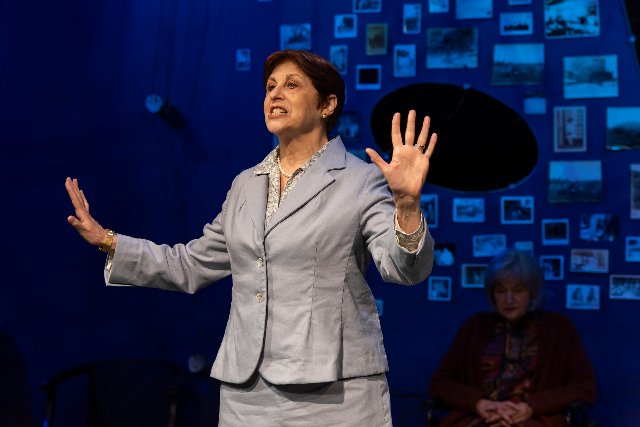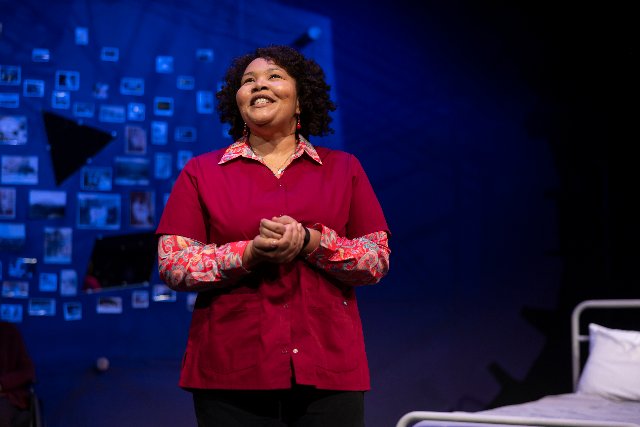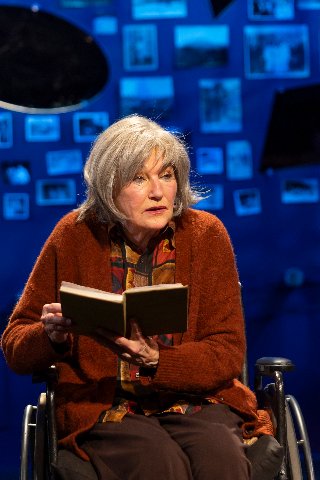The Victim at Shakespeare & Company
Lawrence Goodman World Premiere
By: Charles Giuliano - Jun 22, 2025
The Victim
By Lawrence Goodman
Directed by Daniel Gidron
Set, John Musall; Lighting, Erika Johnson; Costumes, Govane Lohbauer; Sound, Amy Atadonna
Cast: Stephanie Clayman (Daphne), Yvette King (Maria), Annette Miller (Ruth)
Elayne P. Bernstein Theatre
Shakespeare & Company
June 19-July 20
With The Victim playwright, Lawrence Goodman, has bitten off a lot to chew in a dense one act play that feels more like three. It presents monologues by three remarkable actresses: Stephanie Clayman (Daphne), Yvette King (Maria), and Annette Miller (Ruth). He takes on DEI, The Holocaust, and The Covid Pandemic.
The play was workshopped at S&Co and, based on its reception last year, given a world premiere this season. Artistic director, Alyn Burrows spoke with pride of the company’s role in developing new work.
The simple set by John Musall is sparse, essential and distracting. All three characters make use of the bed which signifies Ruth as an elderly invalid. The back wall has a pattern of family snapshots and several fragments of mirrors. From a distance, they are undecipherable. After the performance some audience members approached to give them a better look. Against that wall are set three chairs. The women sit while each takes a turn at performing.
First up is Daphne, the mother of Ruth, and employer of at home, care provider Maria. She is a physician, Dr. Davidovich, and only daughter of a Holocaust survivor. As a hospital staff member she was put through DEI training that has largely backfired. The articulation of its implementation evoked laughter. While the playwright has included levity to what is a dark play, the first monologue felt like misguided comedy.
While pursuing an intense practice as a clinician Daphne’s primary concern is providing adequate care for her mother. That entails micro managing Maria who, at first, seems adequate for the job. Several of her incompetent predecessors were fired. By phone Daphne is constantly and intrusively checking in. Maria has been given a binder of detailed instructions “as thick as a telephone book.”
Daphne appears to take a disingenuous interest in Maria. Although the Dominican born care provider barely managed to finish high school her employer insists that she would make an excellent nurse. She can put in a word with the head of the program and insists that they are eager for a certain kind of applicants. She also suggests a specialist to treat her mother’s asthma. While Clayman delivers an impeccable performance she becomes ever less appealing.
Next up Maria, in her version of what has transpired, offers a compelling rebuttal. There is immediate empathy for her challenges as a provider. She has her own difficult and ailing mother as well as son in desperate need of guidance and discipline. When there is a crisis at home she gambles that Ruth will sleep through a brief absence. Subsequent to a call from Daphne she is summarily fired.
It’s the height of the pandemic and they end up in the ER. Maria’s mother has Covid but, because she is Hispanic, appears to get less attention and care than white patients. She observed Daphne ignoring the chaos to focus on treating “her own people.” Here the performance of King slips into overdrive. It reveals the awesome potential of an emerging actress.
While desperately trying to get attention for her mother she is ejected from the ER by security. There is the droll observation that they are Hispanic. Later, by phone, she is informed that her mother has passed though “we did all we could.” Which is to say, nothing.
When Maria proclaims victimhood at the hands of the dictator, Rafael Trujillo, she is rebutted. Recounting how citizens were hacked to death with machetes she compares him to Hitler.
That argument is rebutted by Daphne citing the Holocaust and its slaughter of 6 million Jews. The playwright treads a narrow line in developing these absurdist arguments. That, however, appears to the agenda of the play. Who indeed is the Victim? How do you weigh the slaughter of thousands by Trujillo to the millions annihilated by Hitler? Do relative numbers make one crime against humanity less atrocious than another?
The anchor leg is provided by the always remarkable, Annette Miller, now in her 20th season with the company. In a wheelchair the other women roll her to center stage. She has been described as decrepit and suffering dementia. There is a pause as she gathers strength.
In a strident manner she proclaims that she will tell the truth. Just how did it come to pass that she was the only one of some 800 Jews to survive in her Ukranian village? In her mother’s version she crawled out of the execution ditch and managed to be taken in by a kindly farmer’s widow. Together they survived the war.
With harrowing detail Ruth describes how the Jews were rounded up and taken to the forest. Their friends and neighbors stood by and applauded. That included the children who had played with their children.
After a large ditch was dug they were told to strip. Row after row they were shot and piled higher and higher. When the Nazi’s went away Ruth discovered that she was still alive. She climbed out and found clothes and “good boots.”
This account of climbing out from a mountain of corpses reminds me of Le Colonel Chabert an 1832 novella by Honoré de Balzac (1799–1850). As an undergraduate I was horrified by its vivid imagery.
Given her elderly and sickly condition the vigorous performance by Miller is as compelling as it is inexplicable. Her failing memory is jogged by reading from a diary written long ago.
Having escaped death she staggered through the forest until she found a farmhouse. The widow who reluctantly took her in was a nightmare. It seems that she had worked as a domestic for a Jewish family that taunted and abused her. Now the tables were turned and it was time for revenge. Ruth begs for food but is harshly told to “sweep, sweep.” Disobey and “I will call the Germans.” Finally she is fed pork sausage which she vomits.
We won’t spoil what happens but Ruth survives the war. The play left us with much to think about.



